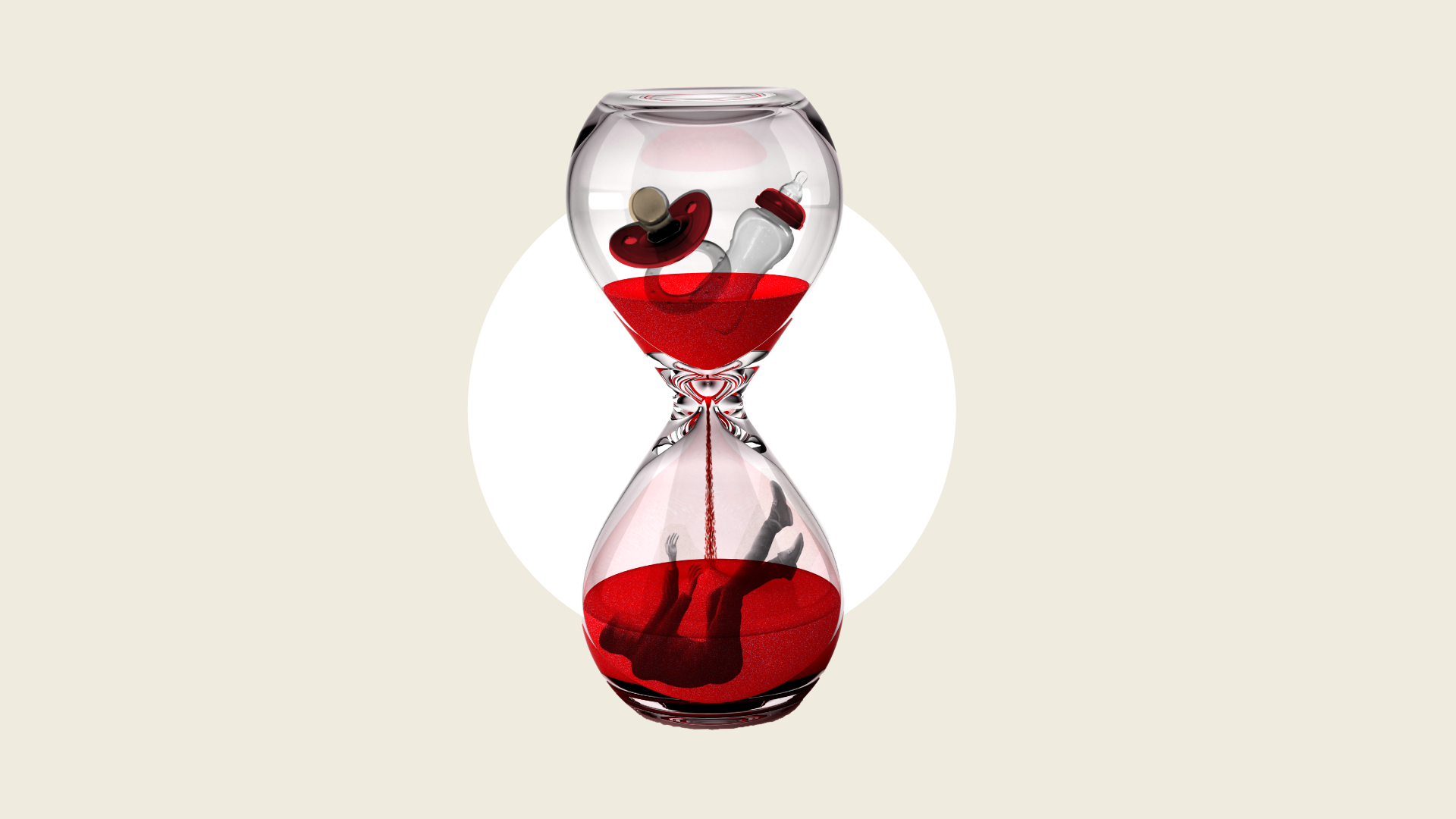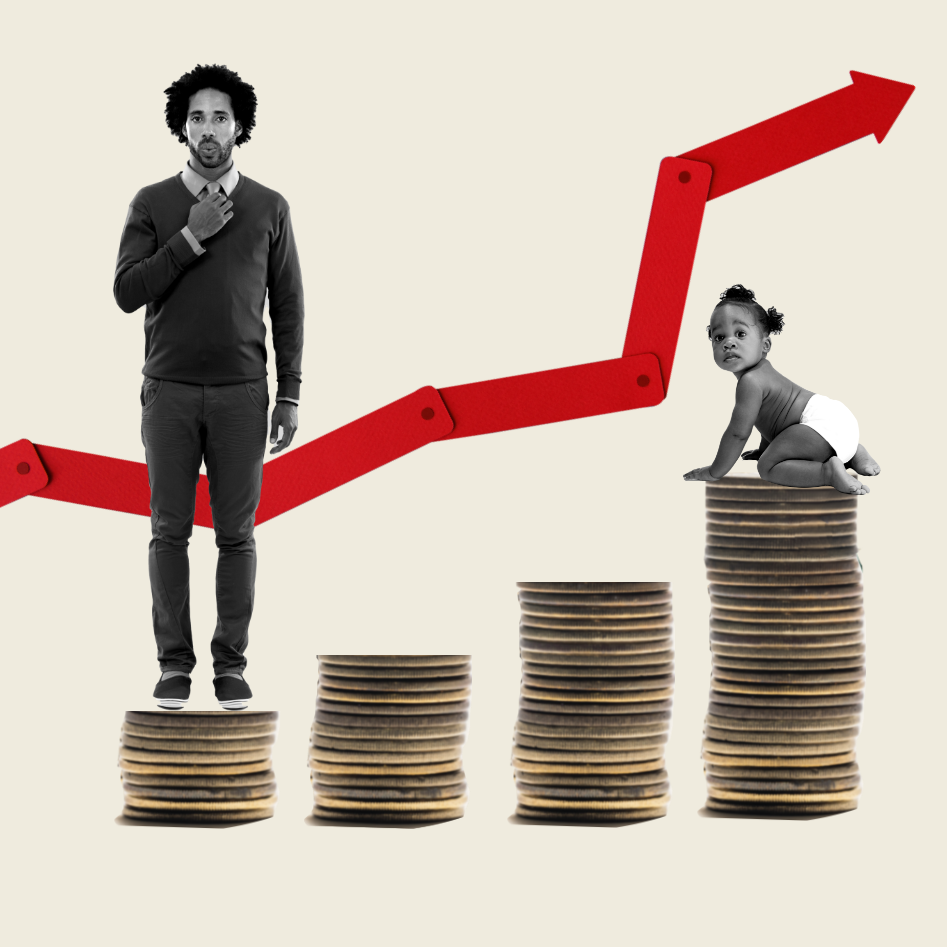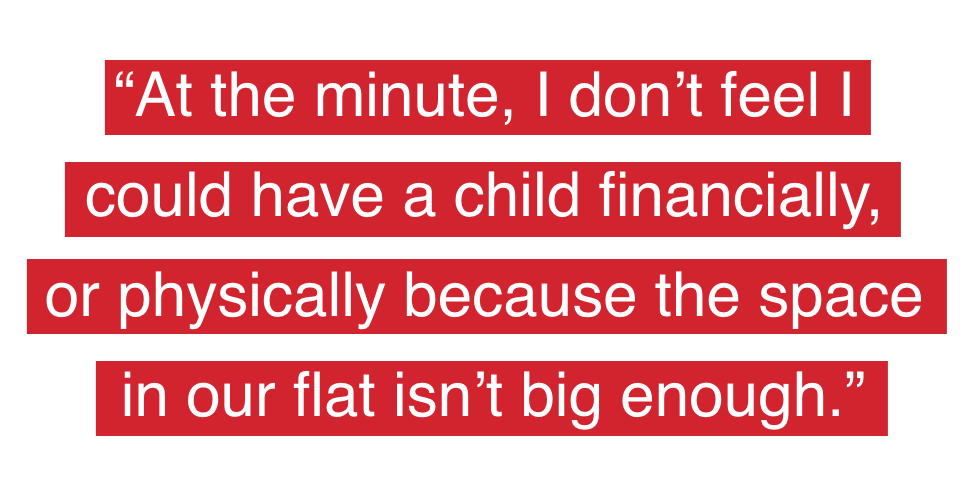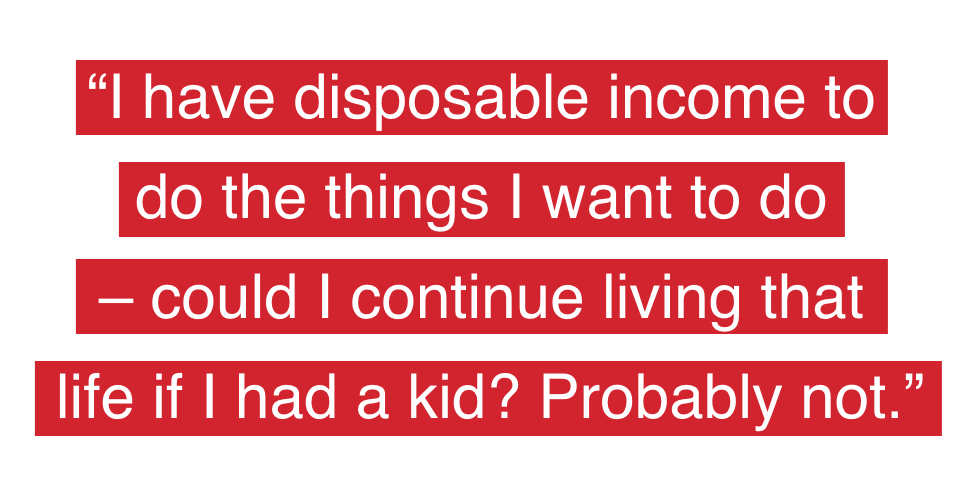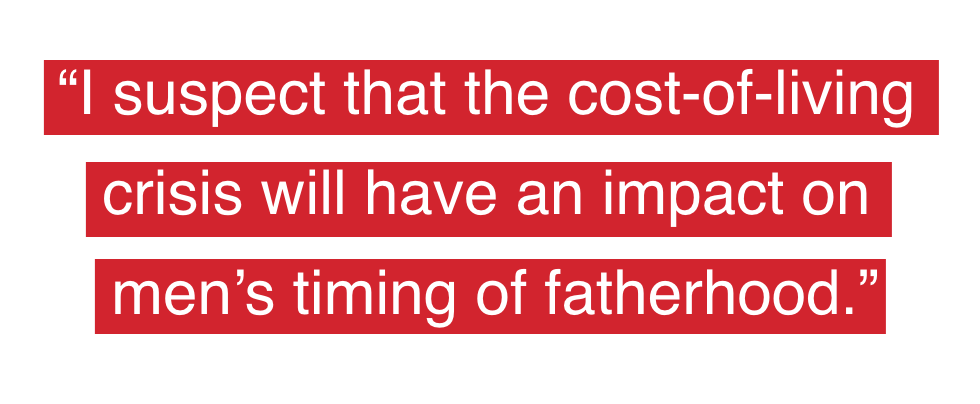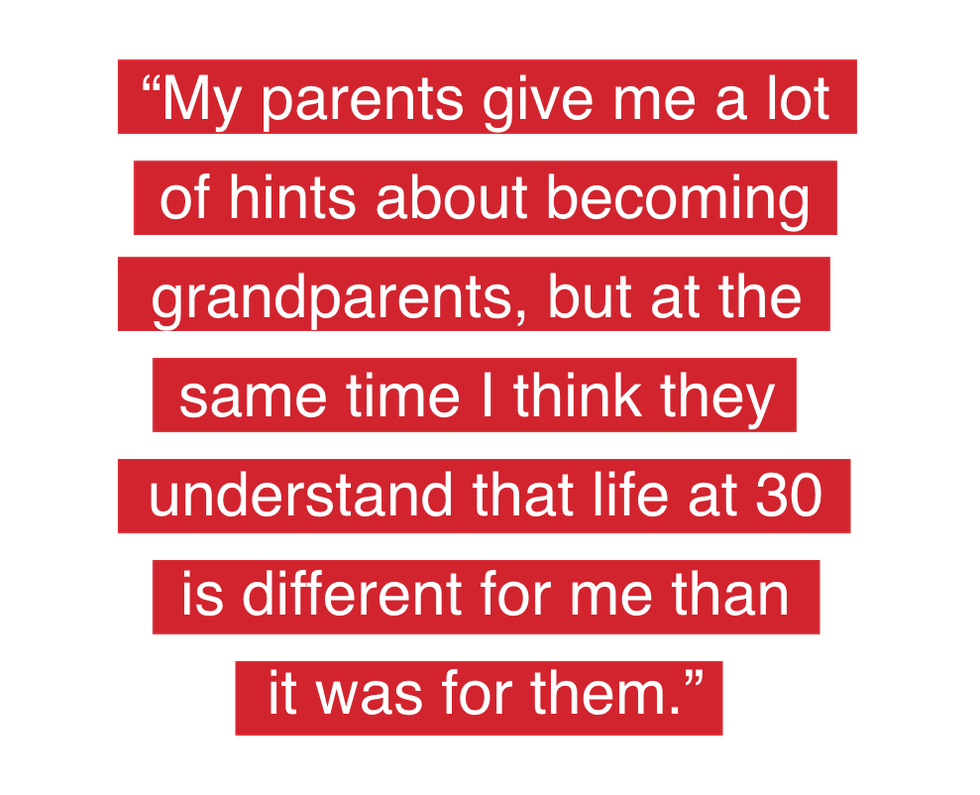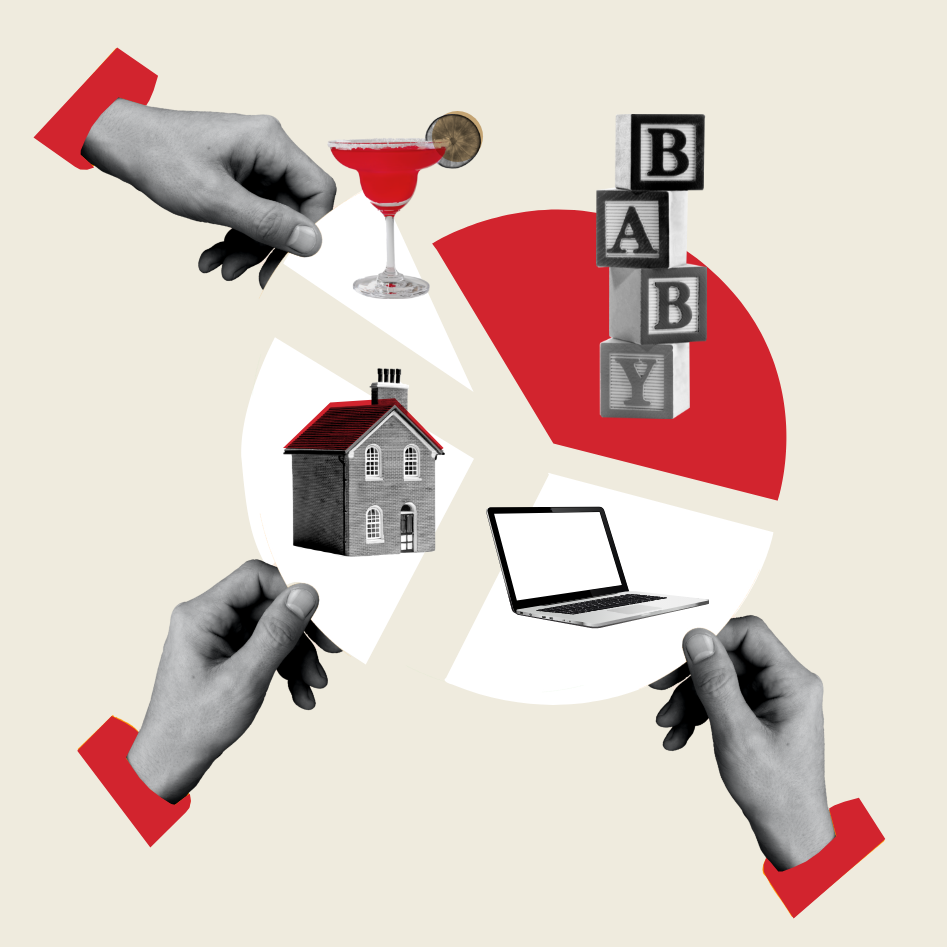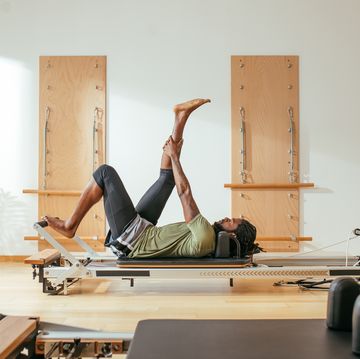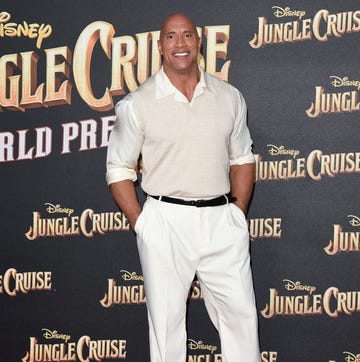Dads are getting older. Not just your dad, greying and irritable, where once he was young and irritable, but fathers in general. According to the most recent data from the Office of National Statistics, the average age of a first-time father in the UK is now 33.6 years old, which amounts to a year-on-year increase since at least 2016. Those figures don’t quite tally with a 2021 YouGov poll in which Brits recommended 30 as the best age for a man to have his first child. So what’s with the third of a decade discrepancy?
I’m an average man in my early thirties, with an average amount of friends. But only three men I know have children. One had his first in his mid-20s, opting to get it out of the way then focus on his career. He’s the anomaly. The other two became first-time parents in their mid to late 30s.
The reasons for the delay are myriad, but a recurring theme is that raising a child isn’t cheap. In fact, March 2022 data from wealth mangers Moneyfarm calculated the cost of raising a child to 18 in the UK at somewhere between £129,000 and £327,000. Now, clearly, you don’t need a lump sum to have a child; you can pay for your kids in instalments, like your smartphone. But still. Add to that the cost of buying a house, and you know, living, and it all starts to stack up.
Like most men I know, I’m uncertain about having children. I worry I won’t be able to afford them. I worry that having children will stop me achieving what I want to career-wise. And, to be honest, I quite like my freedom. I have an abstract notion of having children in my 40s, but if that did come to pass, I’d be in my mid-50s by the time they’re teenagers. By the time they’re embarking on their careers, meeting partners, having their own children I could well be pushing up daisies. As for my own parents’ (now in their mid-60s) chances of getting to watch their grandchildren reach double figures. Unless an elixir proffering eternal life miraculously springs forth from their potato patch, it’s slim to none.
I’m not the only one who feels this way. Kieran, 30, is an art director at a creative agency in London. “My partner and I are currently going through a process of being priced out of renting and figuring out, how do we buy?” he tells me. “At the minute, I don’t feel I could have a child financially, or physically because the space in our flat isn’t big enough. Right now, having children is a financial issue more than anything else – you need to afford a bigger house, in a convenient area, then on top of the mortgage you want to be able to give your family the life it deserves.”
Providing shelter for your offspring is a fairly crucial requirement. House prices in the UK have been taking the mickey for a while now, and the current housing crisis has only made things worse. Dr Jasmine Kelland, a lecturer in human resource studies at Plymouth Business School and author of Caregiving Fathers in the Workplace – Organisational Experiences and the Fatherhood Forfeit, is uniquely placed to discuss the socio-economic difficulties Kieran describes. “The desire to have purchased a home is a key factor in men delaying fatherhood,” she explains. “The way we purchase homes has changed, long gone are the days of 100% mortgages and the necessity to save a substantial deposit is likely to cause a delay in fatherhood. I suspect that the cost-of-living crisis will have an impact on men’s timing of fatherhood.”
“For me and my partner, there are certain steps we want to achieve before we stop and think about having a family,” Kieran explains. “When I was younger, I thought that by the time I was 30 I’d be living the life, earning all this money and being able to do what I want with it, but that hasn’t come as quickly as I’d like. Now I am earning money I’m trying to live a life that’s more selfish for me, I have disposable income to do the things I want to do – could I continue living that life if I had a kid? Probably not.”
Last year, as he passed from his twenties to his thirties, Kieran says he started to get seriously worried about being ‘timed out’ of having kids. “I keep reminding myself that I’ve got time but when I look at my ambitions for the next few years, it definitely condenses the window of opportunity to have kids.”
What Kieran fears has become known as the male biological clock, because while men can have children at any age, there does come a point where having children either becomes harder or just stops making sense. “The biological clocks of men and women are totally different. Women’s fertility starts declining after 35-37 years and it stops completely at menopause,” explains Ilpo Huhtaniemi, Professor of reproductive endocrinology at Imperial College London. “The decline of reproductive capacity in men decreases very slowly after 40-50 years. The decline is partly due to chronological ageing and partly to lifestyle factors (especially obesity) and common diseases, but even the oldest old men can be fertile.”
Just because we can have children later in life, should we? Isn’t there an increased risk of illness or abnormalities as we age? “The single point mutations in sperm which are responsible for achondroplasia and Apert's syndrome increase with the man's age,” explains Huhtaniemi. In case of Apert's syndrome this increase is believed to be the result of a genetic fault in sperm.” What’s more, Huhtaniemi explains that some autosomal dominant diseases and diseases of complex aetiology (like schizophrenia) are associated with advancing paternal age. Huhtaniemi is keen to point out, however, that although anomalies increase in sperm with a man's age, “the risk is small, and should not defer older fathers from having children.”
The risk may be slight, but being able to conceive at an older age can still be difficult. “Delayed childbearing is a common phenomenon in industrialised countries and research shows that men aged 40-plus years contribute to reduced fertility and fecundity of a couple, especially when the female partner is also of advanced age,” explains Huhtaniemi.
According to Huhtaniemi, sperm quality has been steadily decreasing in numerous countries over the last decade. While the cause remains elusive, he believes that smoking, obesity and sedentary lifestyles may play a role. “One popular theory claims that the reasons are specific chemical compounds, so-called endocrine disruptors, that accumulate in the environment,” Huhtaniemi explains. “There is a lot of experimental evidence (i.e. animal tests) showing harmful effects of endocrine disruptors, for example on sperm quality. However, when I ask experts in the field, which I often do, what is the best example of endocrine disruptors having serious harmful effects on human health, I never get a clear answer. Declining sperm counts are apparently a fact, but no one knows why.”
A 2017 study by Dr Laura Dodge, an assistant professor of reproductive biology at Beth Israel Deaconess Medical Center in Boston, sheds some light on the dangers older man can face when trying to conceive. Dodge looked at the records of 19,000 couples who had undergone IVF and found that three quarters of couples where the man was aged under 35 would have a live birth after six rounds of IVF. When the guy was over 45, this dropped to 60%. “It’s something to be aware of, in the same way that women are aware their fertility declines with time,” Dodge told The Guardian.
Say you’re lucky enough to have children in your 40s or older, and that child is healthy. The question then becomes, just how healthy are your knees? “I grew up with really young parents, my dad was always really active with me as a kid,” says Kieran. “I like to think of myself as quite active, but if I have kids later and I’m in my 40s or older when they’re growing up, I’m not going to be as active as I might want to be.”
Kieran also asks whether it will be easy for an older parent to switch their focus after 35 to 40 years of putting themselves first. “My parents have friends who had children in their late 30s and are quite hands-off with their kids. My parents are quite critical of them. But who knows? I’m still going to want to go to football on a Thursday night when I’m a dad, I don’t want to give that up.
“[That said] I am sad I’m not in a position to have kids right now, but then again in many ways it is my decision. My parents give me a lot of hints about becoming grandparents, but at the same time I think they understand that life at 30 is different for me than it was for them.”
I was interested to hear how my own father’s generation feels about this. My uncle, who’s 60 with two sons in their early 20s, answered some questions via Facebook. A Boomer, he describes a culture of rushing to have children when he was growing up. “When I was 20 people had two kids and then missed out on 10 to 15 years of freedom,” he says.
Because of this, he describes a sense of panic setting in when he found himself 30, single and heir-less (as opposed to 60, single and hairless). His first child was born four-years later. He remains active and engaged in both of his son’s lives and doesn’t feel waiting until he was older compromised his ability to be a dad. “From the financial point of view, I don't think that matters, it's the relief of finding someone and being wanted, and being able to start a family,” he adds.
There’s a good point here. While we’d like to earn a certain amount of money before we have children, and while we don’t want to give up our own new clothes and flat whites just because we have a baby to feed, clothe and house, that’s a privileged perspective on fatherhood. After all, people used to have children in caves, without so much as a few dinosaur bones in the bank, and the human race has survived this far. Then again, life was simpler then; cave fathers probably weren’t too worried about living to old age or encouraging their children to live their best lives.
There’s an adage that no matter when you have children, you’ll never be ready. But modern man, it seems, is prepared to give himself as much time as possible to prepare, even if that means potentially losing the chance to have children altogether.
As for being too old to physically engage with your children as an older father, Professor Huhtaniemi offers some final thoughts: “Of course, if the father is so old that he is physically compromised, he may not be an optimal father. But a father can be a good father in many different ways.”
